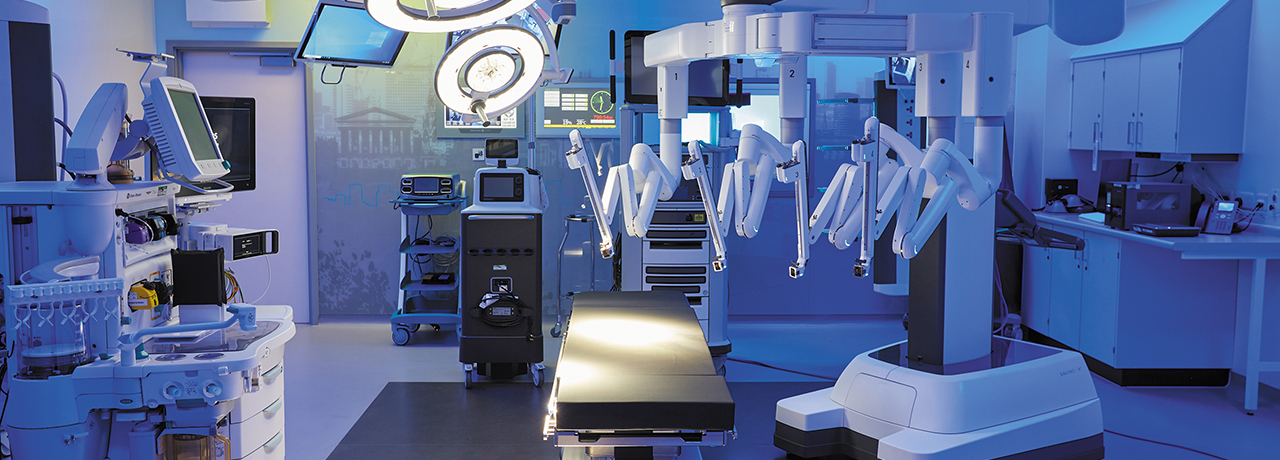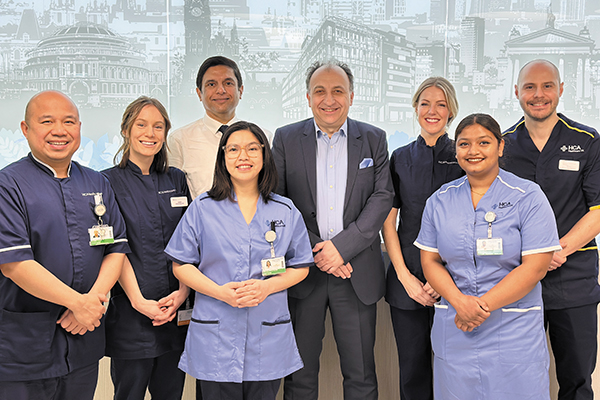
When HCA Healthcare came to the UK in the 1990s, we did so to do something not being done in the independent sector – establish hospitals with a deep clinical infrastructure and governance to provide the most complex care otherwise unavailable outside of the UK's National Health Service (NHS). Today, we still have that point of difference, providing levels of complex care on a scale not matched in the sector and with nearly three decades of experience in the UK to guide us.
Our reputation for high-quality care and proximity to world-renowned NHS teaching hospitals has enabled us to partner with consultants across London, Manchester and Birmingham, each with established reputations as leaders in their field of medicine.
We actively embrace innovation and are early adopters of new medicine and technology for the benefit of our patients. In 2024, we received the ‘Innovation with a patient focus award' from Private Healthcare Information Network (PHIN), cementing our status as the hospital network that has provided both the most and widest range of robotic-assisted procedures in the UK – more than 16,000 to date. Read on to learn about how we’re shaping the future of healthcare through innovation.
One year on from HCA UK becoming the first independent hospital provider in Europe to introduce Ion™ robotic-assisted technology, we have supported over 100 patients with access to an innovation that can diagnose lung cancer earlier.
The combination of Intuitive's state-of-the-art technology and the expertise of the London Bridge Hospital team in consultant thoracic surgeon Mr Tom Routledge and consultant respiratory physician Professor George Santis, has enabled previously unreachable lung nodules to be biopsied. If lung cancer is found to be present then patients can begin treatment plans sooner. “Suspected lung cancer cases can mean a period of ‘watchful waiting’, leading to increased worry for patients,” explains Mr Routledge. “Ion™ allows us to reach areas of the lung that have previously been hard to reach, which is both clinically game-changing and transformative for patient wellbeing.”
In March 2024, HCA UK became the first provider in the UK to offer patients access to da Vinci Single Port (SP) technology, making complex surgery possible through one single, small incision. By further reducing the post-operative discomfort of creating surgical wounds, and enabling patients to benefit from robotic-assisted surgery for whom it otherwise may not have been suitable (for example, those with lots of scar tissue from previous operations, or those who are unable to have multiple incisions), the da Vinci SP system has the potential to be transformative for patients.
Launched at London Bridge Hospital by consultant urological surgeons Mr Ben Challacombe, Professor Christopher Eden, Mr Declan Cahill and Mr Rajesh Nair, this procedure has been extended to patients requiring thoracic surgery – another first for HCA UK. The novel surgical approach, led by Mr Routledge, allows patients – typically those living with lung cancer – to quickly return to daily life with minimal discomfort. “We are proud to be among the first in Europe to offer this option,” says Mr Routledge, “which reflects the depth and breadth of our experience in robotic thoracic surgery.”
HCA UK is proud to be the first private healthcare provider in the country, outside of clinical trials, to offer pioneering gene-edited therapy for sickle cell disease and beta thalassemia. This treatment is now available at HCA UK at University College Hospital and will be delivered under the expert care of Dr Panagiotis Kottaridis, medical director and consultant haematologist.
Sickle cell disease and beta thalassemia are genetic conditions that impact the production of haemoglobin in red blood cells, the protein responsible for carrying oxygen around the body. Gene-edited therapy works by repairing the abnormal gene so that the body can create healthy red blood cells.
First, the stem cells are collected from the patient’s blood in a procedure called apheresis. Molecular scissors are then used to precisely cut the DNA at a specific point, harnessing the natural DNA repair process to modify the gene. These are then re-infused to the patient following a course of conditioning chemotherapy, in a process that mirrors a stem cell transplant, and will populate the bone marrow, producing healthy blood cells.

Myeloma affects 180,000 people around the world each year. Currently incurable, it develops in plasma cells that are made in the bone marrow and form part of the immune system, causing abnormal proteins that can damage the body.
HCA UK is proud to be at the forefront of innovation by offering chimeric antigen receptor (CAR T-cell) therapy to eligible myeloma patients. As a pioneering immunotherapy developed through cutting-edge research, this treatment harnesses the power of a patient’s own immune system to target and eliminate blood cancer cells. By introducing this breakthrough therapy, HCA UK is helping lead a new era in cancer care.
A patient’s T-cells – a type of white blood cell that plays a key role in the immune system – are collected from their blood. In a specialised laboratory, the T-cells are genetically engineered to produce chimeric antigen receptors (CARs). These receptors enable the T-cells to recognise and attack specific proteins found on the surface of cancer cells. Multiplied in large quantities, these re-engineered T-cells are then infused back into the patient’s bloodstream, where they seek out and destroy cancer cells. Once in the body, the CAR T-cells identify and bind to the cancer cells, triggering an immune response to eliminate them.
“CAR T-cell therapy is a significant breakthrough in blood cancer treatment,” explains Professor Ashutosh Wechalekar, consultant haematologist at HCA UK at University College Hospital. “We’ve seen incredible results using CAR T-cells to treat other blood cancers, lymphoma and leukaemia, and this therapy represents a transformative step forward for myeloma treatment at HCA UK, giving new hope to patients.”
For more information about HCA UK, scan the QR code:

Or call the team today: +44 (0)20 4525 2530